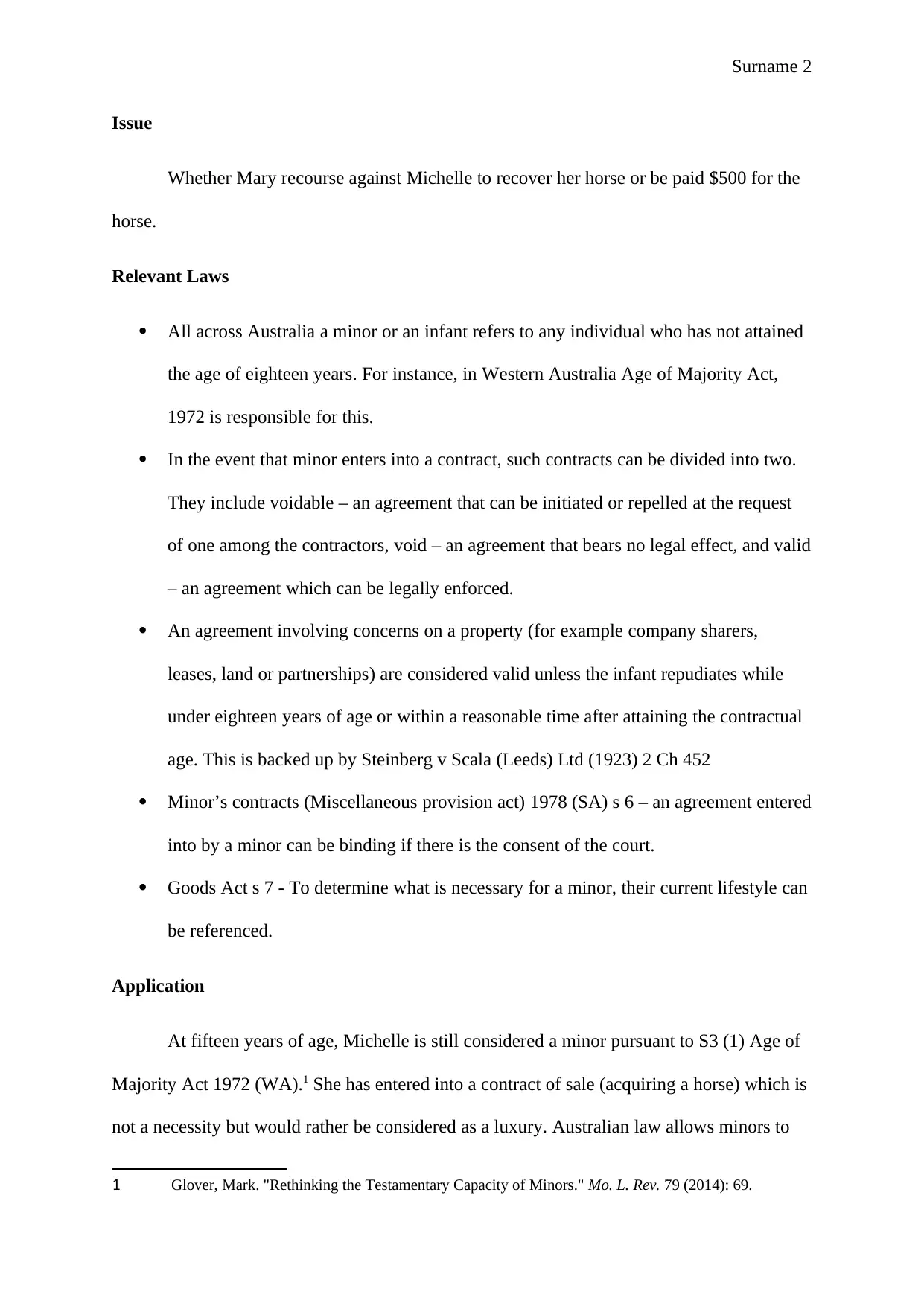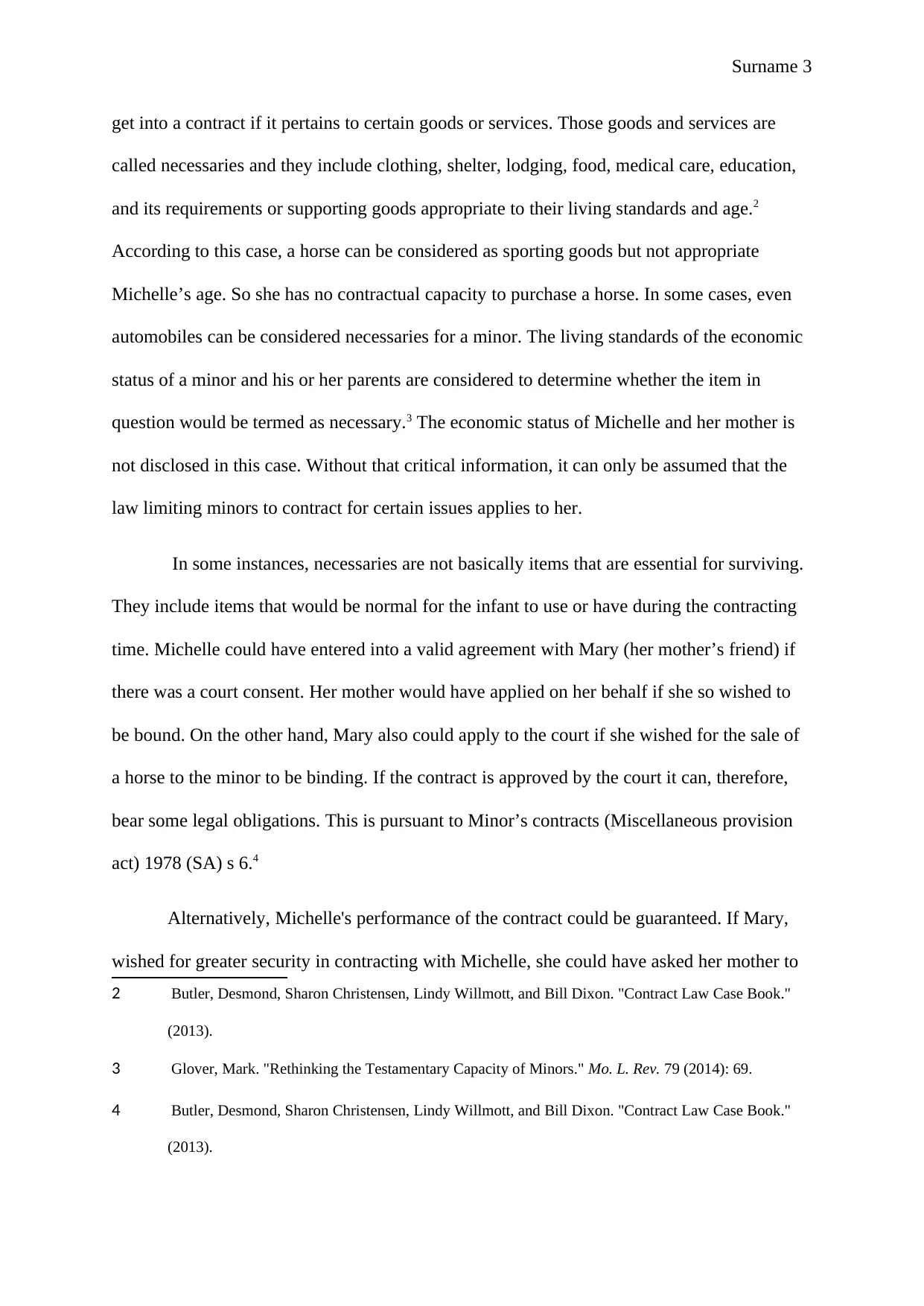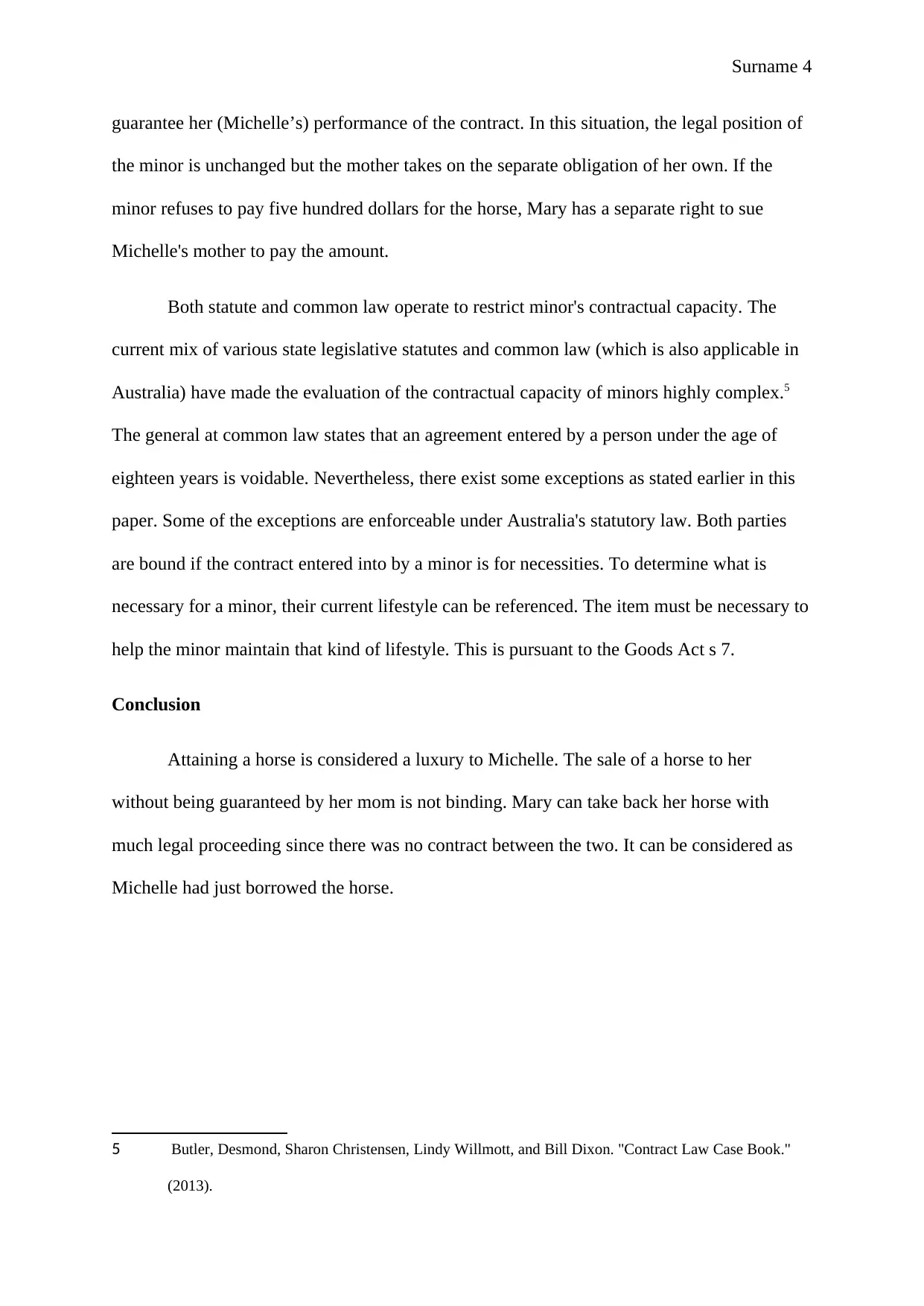Mudrock University BSL165: Minor's Contract and Horse Sale Dispute
VerifiedAdded on 2022/12/28
|5
|969
|82
Case Study
AI Summary
This assignment analyzes a case concerning a 15-year-old minor, Michelle, who purchases a horse from Mary but refuses to pay. The assignment explores the legal principles governing a minor's contractual capacity in Australia, referencing the Age of Majority Act 1972 (WA) and relevant case law such as Steinberg v Scala (Leeds) Ltd (1923). It distinguishes between void, voidable, and valid contracts, focusing on the concept of 'necessaries' and whether a horse falls under this category. The analysis considers the application of the Goods Act s 7 and the Minor’s Contracts (Miscellaneous provision act) 1978 (SA) s 6. The conclusion is that the contract is not binding on Michelle, and Mary can likely reclaim the horse as the purchase is considered a luxury, not a necessity. The assignment also highlights the potential for court consent or parental guarantees to alter the contractual obligations.

Surname 1
Contractual Capacity to Minors
Name:
Course:
Date:
Contractual Capacity to Minors
Name:
Course:
Date:
Paraphrase This Document
Need a fresh take? Get an instant paraphrase of this document with our AI Paraphraser

Surname 2
Issue
Whether Mary recourse against Michelle to recover her horse or be paid $500 for the
horse.
Relevant Laws
All across Australia a minor or an infant refers to any individual who has not attained
the age of eighteen years. For instance, in Western Australia Age of Majority Act,
1972 is responsible for this.
In the event that minor enters into a contract, such contracts can be divided into two.
They include voidable – an agreement that can be initiated or repelled at the request
of one among the contractors, void – an agreement that bears no legal effect, and valid
– an agreement which can be legally enforced.
An agreement involving concerns on a property (for example company sharers,
leases, land or partnerships) are considered valid unless the infant repudiates while
under eighteen years of age or within a reasonable time after attaining the contractual
age. This is backed up by Steinberg v Scala (Leeds) Ltd (1923) 2 Ch 452
Minor’s contracts (Miscellaneous provision act) 1978 (SA) s 6 – an agreement entered
into by a minor can be binding if there is the consent of the court.
Goods Act s 7 - To determine what is necessary for a minor, their current lifestyle can
be referenced.
Application
At fifteen years of age, Michelle is still considered a minor pursuant to S3 (1) Age of
Majority Act 1972 (WA).1 She has entered into a contract of sale (acquiring a horse) which is
not a necessity but would rather be considered as a luxury. Australian law allows minors to
1 Glover, Mark. "Rethinking the Testamentary Capacity of Minors." Mo. L. Rev. 79 (2014): 69.
Issue
Whether Mary recourse against Michelle to recover her horse or be paid $500 for the
horse.
Relevant Laws
All across Australia a minor or an infant refers to any individual who has not attained
the age of eighteen years. For instance, in Western Australia Age of Majority Act,
1972 is responsible for this.
In the event that minor enters into a contract, such contracts can be divided into two.
They include voidable – an agreement that can be initiated or repelled at the request
of one among the contractors, void – an agreement that bears no legal effect, and valid
– an agreement which can be legally enforced.
An agreement involving concerns on a property (for example company sharers,
leases, land or partnerships) are considered valid unless the infant repudiates while
under eighteen years of age or within a reasonable time after attaining the contractual
age. This is backed up by Steinberg v Scala (Leeds) Ltd (1923) 2 Ch 452
Minor’s contracts (Miscellaneous provision act) 1978 (SA) s 6 – an agreement entered
into by a minor can be binding if there is the consent of the court.
Goods Act s 7 - To determine what is necessary for a minor, their current lifestyle can
be referenced.
Application
At fifteen years of age, Michelle is still considered a minor pursuant to S3 (1) Age of
Majority Act 1972 (WA).1 She has entered into a contract of sale (acquiring a horse) which is
not a necessity but would rather be considered as a luxury. Australian law allows minors to
1 Glover, Mark. "Rethinking the Testamentary Capacity of Minors." Mo. L. Rev. 79 (2014): 69.

Surname 3
get into a contract if it pertains to certain goods or services. Those goods and services are
called necessaries and they include clothing, shelter, lodging, food, medical care, education,
and its requirements or supporting goods appropriate to their living standards and age.2
According to this case, a horse can be considered as sporting goods but not appropriate
Michelle’s age. So she has no contractual capacity to purchase a horse. In some cases, even
automobiles can be considered necessaries for a minor. The living standards of the economic
status of a minor and his or her parents are considered to determine whether the item in
question would be termed as necessary.3 The economic status of Michelle and her mother is
not disclosed in this case. Without that critical information, it can only be assumed that the
law limiting minors to contract for certain issues applies to her.
In some instances, necessaries are not basically items that are essential for surviving.
They include items that would be normal for the infant to use or have during the contracting
time. Michelle could have entered into a valid agreement with Mary (her mother’s friend) if
there was a court consent. Her mother would have applied on her behalf if she so wished to
be bound. On the other hand, Mary also could apply to the court if she wished for the sale of
a horse to the minor to be binding. If the contract is approved by the court it can, therefore,
bear some legal obligations. This is pursuant to Minor’s contracts (Miscellaneous provision
act) 1978 (SA) s 6.4
Alternatively, Michelle's performance of the contract could be guaranteed. If Mary,
wished for greater security in contracting with Michelle, she could have asked her mother to
2 Butler, Desmond, Sharon Christensen, Lindy Willmott, and Bill Dixon. "Contract Law Case Book."
(2013).
3 Glover, Mark. "Rethinking the Testamentary Capacity of Minors." Mo. L. Rev. 79 (2014): 69.
4 Butler, Desmond, Sharon Christensen, Lindy Willmott, and Bill Dixon. "Contract Law Case Book."
(2013).
get into a contract if it pertains to certain goods or services. Those goods and services are
called necessaries and they include clothing, shelter, lodging, food, medical care, education,
and its requirements or supporting goods appropriate to their living standards and age.2
According to this case, a horse can be considered as sporting goods but not appropriate
Michelle’s age. So she has no contractual capacity to purchase a horse. In some cases, even
automobiles can be considered necessaries for a minor. The living standards of the economic
status of a minor and his or her parents are considered to determine whether the item in
question would be termed as necessary.3 The economic status of Michelle and her mother is
not disclosed in this case. Without that critical information, it can only be assumed that the
law limiting minors to contract for certain issues applies to her.
In some instances, necessaries are not basically items that are essential for surviving.
They include items that would be normal for the infant to use or have during the contracting
time. Michelle could have entered into a valid agreement with Mary (her mother’s friend) if
there was a court consent. Her mother would have applied on her behalf if she so wished to
be bound. On the other hand, Mary also could apply to the court if she wished for the sale of
a horse to the minor to be binding. If the contract is approved by the court it can, therefore,
bear some legal obligations. This is pursuant to Minor’s contracts (Miscellaneous provision
act) 1978 (SA) s 6.4
Alternatively, Michelle's performance of the contract could be guaranteed. If Mary,
wished for greater security in contracting with Michelle, she could have asked her mother to
2 Butler, Desmond, Sharon Christensen, Lindy Willmott, and Bill Dixon. "Contract Law Case Book."
(2013).
3 Glover, Mark. "Rethinking the Testamentary Capacity of Minors." Mo. L. Rev. 79 (2014): 69.
4 Butler, Desmond, Sharon Christensen, Lindy Willmott, and Bill Dixon. "Contract Law Case Book."
(2013).
⊘ This is a preview!⊘
Do you want full access?
Subscribe today to unlock all pages.

Trusted by 1+ million students worldwide

Surname 4
guarantee her (Michelle’s) performance of the contract. In this situation, the legal position of
the minor is unchanged but the mother takes on the separate obligation of her own. If the
minor refuses to pay five hundred dollars for the horse, Mary has a separate right to sue
Michelle's mother to pay the amount.
Both statute and common law operate to restrict minor's contractual capacity. The
current mix of various state legislative statutes and common law (which is also applicable in
Australia) have made the evaluation of the contractual capacity of minors highly complex.5
The general at common law states that an agreement entered by a person under the age of
eighteen years is voidable. Nevertheless, there exist some exceptions as stated earlier in this
paper. Some of the exceptions are enforceable under Australia's statutory law. Both parties
are bound if the contract entered into by a minor is for necessities. To determine what is
necessary for a minor, their current lifestyle can be referenced. The item must be necessary to
help the minor maintain that kind of lifestyle. This is pursuant to the Goods Act s 7.
Conclusion
Attaining a horse is considered a luxury to Michelle. The sale of a horse to her
without being guaranteed by her mom is not binding. Mary can take back her horse with
much legal proceeding since there was no contract between the two. It can be considered as
Michelle had just borrowed the horse.
5 Butler, Desmond, Sharon Christensen, Lindy Willmott, and Bill Dixon. "Contract Law Case Book."
(2013).
guarantee her (Michelle’s) performance of the contract. In this situation, the legal position of
the minor is unchanged but the mother takes on the separate obligation of her own. If the
minor refuses to pay five hundred dollars for the horse, Mary has a separate right to sue
Michelle's mother to pay the amount.
Both statute and common law operate to restrict minor's contractual capacity. The
current mix of various state legislative statutes and common law (which is also applicable in
Australia) have made the evaluation of the contractual capacity of minors highly complex.5
The general at common law states that an agreement entered by a person under the age of
eighteen years is voidable. Nevertheless, there exist some exceptions as stated earlier in this
paper. Some of the exceptions are enforceable under Australia's statutory law. Both parties
are bound if the contract entered into by a minor is for necessities. To determine what is
necessary for a minor, their current lifestyle can be referenced. The item must be necessary to
help the minor maintain that kind of lifestyle. This is pursuant to the Goods Act s 7.
Conclusion
Attaining a horse is considered a luxury to Michelle. The sale of a horse to her
without being guaranteed by her mom is not binding. Mary can take back her horse with
much legal proceeding since there was no contract between the two. It can be considered as
Michelle had just borrowed the horse.
5 Butler, Desmond, Sharon Christensen, Lindy Willmott, and Bill Dixon. "Contract Law Case Book."
(2013).
Paraphrase This Document
Need a fresh take? Get an instant paraphrase of this document with our AI Paraphraser

Surname 5
Works cited
Glover, Mark. "Rethinking the Testamentary Capacity of Minors." Mo. L. Rev. 79 (2014): 69.
Butler, Desmond, Sharon Christensen, Lindy Willmott, and Bill Dixon. "Contract Law Case
Book." (2013).
Works cited
Glover, Mark. "Rethinking the Testamentary Capacity of Minors." Mo. L. Rev. 79 (2014): 69.
Butler, Desmond, Sharon Christensen, Lindy Willmott, and Bill Dixon. "Contract Law Case
Book." (2013).
1 out of 5
Related Documents
Your All-in-One AI-Powered Toolkit for Academic Success.
+13062052269
info@desklib.com
Available 24*7 on WhatsApp / Email
![[object Object]](/_next/static/media/star-bottom.7253800d.svg)
Unlock your academic potential
Copyright © 2020–2026 A2Z Services. All Rights Reserved. Developed and managed by ZUCOL.





